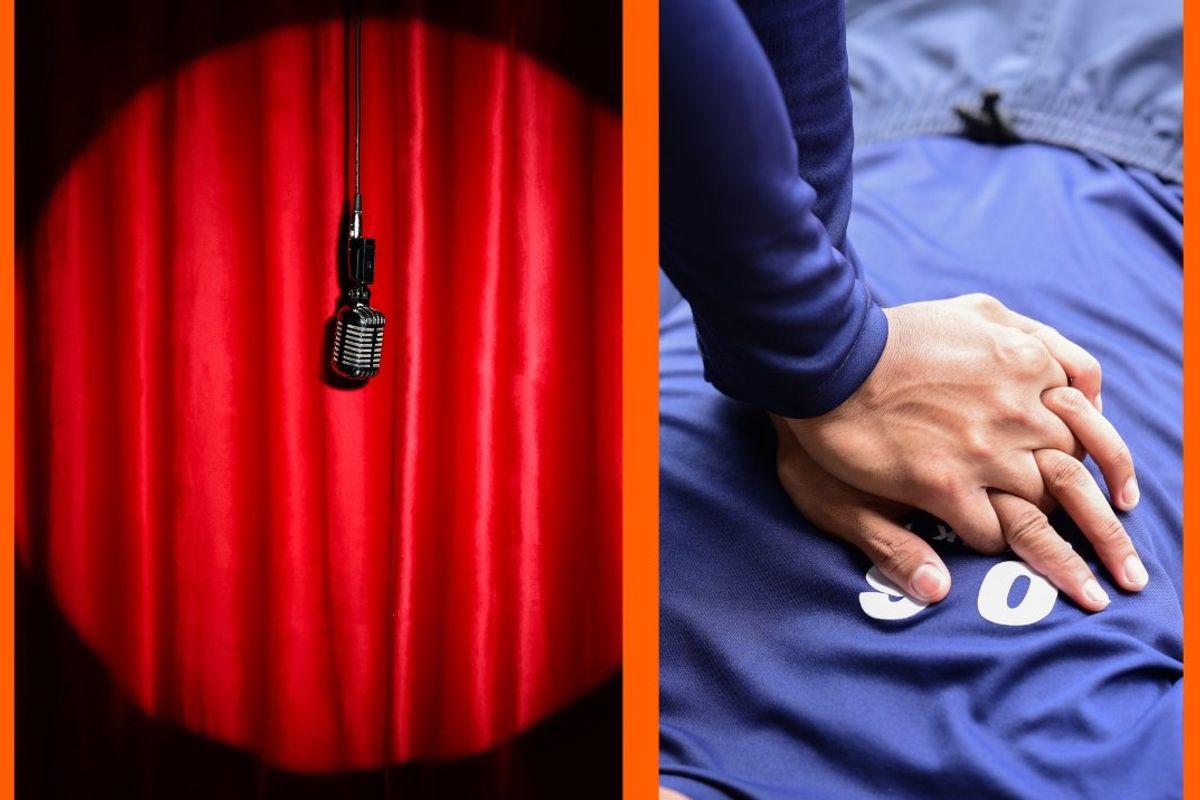A man had a heart attack during a comedy show and the audience stepped in to save his life
"What a wonderful reminder of all the good in the world."
Audience members perform CPR on a man at a comedy show.
Comedian Drew Lynch was on stage mid-set in Spokane, Washington, when he suddenly heard a commotion in the audience. In a video capturing the event, Lynch is seen observing a man in distress. He pauses and asks, "Is everything okay?" An audience member replies, "No!"
Lynch, realizing the severity of the situation, asks, "Is there a medic in the house?" Someone else in the audience frantically screams, "I'm calling 911 right now!" We hear a woman's voice over what sounds like chest compressions say, "CPR started." Another helpfully replies, "I can be your second." The first woman says, "No pulse," and the other confirms, "No pulse."
At this point, Lynch is visibly distraught. The first woman enthusiastically shares, "I think I found a pulse." Audience members begin to gather closer, and Lynch says into the mic, "Thanks, guys. Some room, guys."
A man says, "He's waking up," as we hear ambulance sirens in the near distance. The man continues, "Sir? Can you hear me?" The chyron on the clip says "Paramedics arrive," as a man's voice soothes, "I'm gonna take care of you, okay?"
Some time elapses as we now see a split screen of people with hats reading "SFD" (Spokane Fire Department) taking the man off on a stretcher, while Lynch watches from the stage. A woman says, "Good job, everybody," while the entire room applauds.
What happens next is absolutely beautiful. Still armed with the same microphone that he had just been telling jokes with, Lynch wipes tears from his eyes and asks, "Can I just take a second, guys? Cuz like, that was incredible, dude. Like I know we're here making jokes and doing a bunch of s--t about the town. But you guys all came together in a really cool way, dude." He begins to openly sob, while the audience claps for him. "You saved that guy's life, man," he says. The audience starts clapping louder, adding whistles.
Lynch takes a deep breath and continues, "I mean, that was crazy. You guys worked together so fast, I mean…" He pauses, while an audience member yells out, "Spokane does care!" Lynch adds, "That was nuts, guys. You guys should like…to just witness that, I mean. That was crazy." He then jokes, "I have literally the hardest job in the world now." This gets a big, much-needed laugh from the crowd. A woman hands him some napkins to wipe his tears, which he uses. "I'm dabbing my eyes, I'm like a widow at a funeral, like literally," he says.
Someone suggests he take five, but he remains. "Yeah, no, I mean…" Lynch says. He begins to cry again and can barely push the words out: "Can you guys give a hand to the people who saved that guy's life? That was crazy." Another big round of applause follows, this time with with a standing ovation.

On his Instagram page, Lynch wrote a lengthy message to his fans:
"At a show this past weekend in Spokane, something happened that I will never forget. In the middle of my set, a man in the audience collapsed from a heart attack. What happened next was one of the most powerful examples of community and human connection I’ve ever seen.
Without hesitation, people in the audience began taking turns performing CPR, clearing space for paramedics, and monitoring his vitals. He had no pulse for over 5 minutes. With the combined efforts of total strangers, and honestly, by what felt like a miracle that night, he was revived right there in the room.
The entire audience came together in that moment—no egos, no identities, no division—just one goal: saving a life.
The next day my funny friends @akeemthefunnyguy, @rachelafllejecomedy, and I visited Mr. Wende in the hospital to finish the show for him. Getting to laugh and share stories with his family for hours in the hospital was the reminder I needed of why comedy is so needed—especially in times when the world feels so torn apart.
HUGE thank you to the people of Spokane, the brave medical professionals, and the Wende family for bringing this man into my life and reminding me just how special community can be. #spokane."
@thedrewlynch Just wanted to give an update from the shows last night. #spokane
The comment section was equally moved and supportive. The first response was from the man's (referred to as Mr. Wende) granddaughter. She writes, "It’s a hard watch, but the people who did the CPR saved his life. We are so grateful for the extra time with my grandpa and so grateful for everyone’s support and love!"
A healthcare worker in the comments adds, "As a health care worker I heard ‘I’m calling 911, no pulse, CPR started, I can be your second, sir can you hear me, I’m gonna take care of you.’ ♥ I love my people."
Another shares that, per Lynch's Instagram stories, Mr. Wende was a retired speech therapist.
Lovingly, this fan responds, "What a wonderful reminder of all the good in the world. And a testament to you, Drew, that this is who your audience is."

